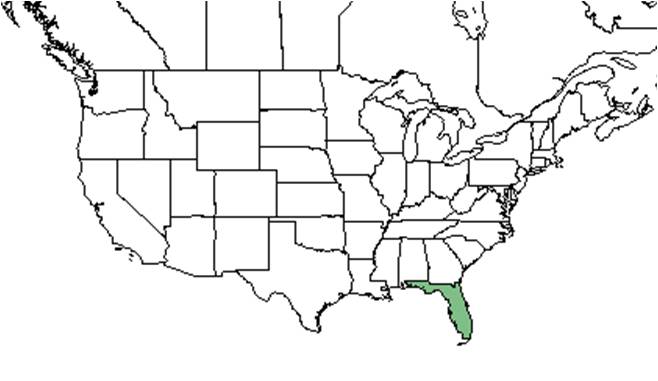Difference between revisions of "Hypericum cumulicola"
KatieMccoy (talk | contribs) (→Description) |
KatieMccoy (talk | contribs) (→Distribution) |
||
| Line 25: | Line 25: | ||
==Distribution== | ==Distribution== | ||
| + | It is a federally endangered species due to habitat loss, fragmentation, and fire suppression<ref name="center"/>. It is endemic to the Lake Wales Ridge, with populations occurring only in Polk and Highland counties. However; within these counties, this species occurs in relatively large populations of hundreds or thousands of individuals <ref name="FWS"/>. | ||
| + | |||
==Ecology== | ==Ecology== | ||
===Habitat=== <!--Natural communities, human disturbed habitats, topography, hydrology, soils, light, fire regime requirements for removal of competition, etc.--> | ===Habitat=== <!--Natural communities, human disturbed habitats, topography, hydrology, soils, light, fire regime requirements for removal of competition, etc.--> | ||
Revision as of 13:11, 5 January 2016
| Hypericum cumulicola | |
|---|---|
Error creating thumbnail: Unable to save thumbnail to destination
| |
| Scientific classification | |
| Kingdom: | Plantae |
| Division: | Magnoliophyta - Flowering plants |
| Class: | Magnoliopsida - Dicotyledons |
| Order: | Theales |
| Family: | Clusiaceae ⁄ Guttiferae |
| Genus: | Hypericum |
| Species: | H. cumulicola |
| Binomial name | |
| Hypericum cumulicola (Small) P. Adams | |

| |
| Natural range of Hypericum cumulicola from USDA NRCS Plants Database. | |
Common name: Highlands Scrub St. John's-wort
Contents
Taxonomic notes
Description
H. cumulicola is a short live perennial herb whose stems die back in winter to non-flowering basal branches [1]. The leaves are needle like and opposite, entire, simple, and gland-dotted. The seeds are pointed, opening into three curved, beaked segments, surrounded by 5 persistent sepals [2]. The yellow flowers are small, bisexual, and arranged in a cyme. It may contain hypericin, which is common of species in this genus [3]. The leaves and flowers are similar to Hypericum gentianoides, but can be differentiated by having a single, winged-angled main stem and lacking a cluster of basal branches [1].
Distribution
It is a federally endangered species due to habitat loss, fragmentation, and fire suppression[2]. It is endemic to the Lake Wales Ridge, with populations occurring only in Polk and Highland counties. However; within these counties, this species occurs in relatively large populations of hundreds or thousands of individuals [3].
Ecology
Habitat
In the Coastal Plain in Florida, H. cumulicola occurs in Pinus clausa scrubs with xerophytic oaks (FSU Herbarium). Associated species include Ceratolia, Selaginella, Pinus clausa, Prunus geniculata, Polygonella, and Paronychia pulvinata (FSU Herbarium).
Phenology
Flowers in September and fruits in September and November (FSU Herbarium).
Seed dispersal
Seed bank and germination
Fire ecology
Pollination
The following Hymenoptera families and species were observed visiting flowers of Hypericum cumulicola at Archbold Biological Station (Deyrup 2015):
Apidae: Bombus impatiens
Halictidae: Augochloropsis sumptuosa, Lasioglossum miniatulus, L. nymphalis
Use by animals
Diseases and parasites
Conservation and Management
Cultivation and restoration
Photo Gallery
References and notes
Deyrup, M.A. and N.D. 2015. Database of observations of Hymenoptera visitations to flowers of plants on Archbold Biological Station, Florida, USA.
Florida State University Robert K. Godfrey Herbarium database. URL: http://herbarium.bio.fsu.edu. Last accessed: October 2015. Collectors: W.P. Adams , Beverly Judd, Walter S. Judd, O. Lakela, James D. Ray Jr., D.B. Ward. States and Counties: Florida: Highlands, Polk. Compiled by Tall Timbers Research Station and Land Conservancy.